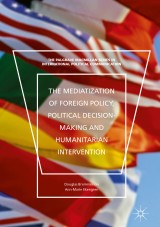Details

The Mediatization of Foreign Policy, Political Decision-Making and Humanitarian Intervention
The Palgrave Macmillan Series in International Political Communication
|
CHF 130.00 |
|
| Verlag: | Palgrave Macmillan |
| Format: | |
| Veröffentl.: | 16.01.2017 |
| ISBN/EAN: | 9781137544612 |
| Sprache: | englisch |
Dieses eBook enthält ein Wasserzeichen.
Beschreibungen
This book examines under what scope conditions foreign policy actors adopt media logic. The authors analyze media logic under three specific scope conditions: uncertainty, identity, resonance. First, they lay out the general adaptation of media logic in the general debate of the UN General Assembly 1992-2010. They then explore the adaptation of media logic in Finland, Sweden and the United Kingdom concerning the cases of humanitarian intervention in Côte d’Ivoire and Libya, both in 2011. The results indicate the need to move beyond the assumption of a general process of mediatization affecting politics in total. Instead, they point in the direction of a nuanced process of mediatization more likely under certain scope conditions and in certain political contexts.
1. Mediatization of foreign policy decision-making .- 2. The scope conditions of mediatized foreign policy .- 3. Design and methodological concerns .- 4. Mediatization in the United Nations General Assembly .- 5. Political logic at play in Côte d’Ivoire .- 6. Mixed logics at play in Libya .- 7. Conclusion: towards a theory on the variation of mediatization of foreign policy.
<b>Douglas Brommesson</b> is Associate Professor in Political Science at Lund University, Sweden. His main research interests include foreign policy analysis, international relations and religion and politics. Most recently, he co-edited the volume <i>Global Community? Transnational and Transdisciplinary Exchanges</i> (2015). His articles have appeared in journals such as <i>Cooperation and Conflict</i>, <i>International Politics</i>, the <i>Journal of International Relations and Development</i>, and the <i>International Review of Sociology</i>. <div><br></div><div><b>Ann-Marie Ekengren</b> is Professor in Political Science at the University of Gothenburg, Sweden. Her research areas are foreign policy decision-making, international relations and party politics. Ekengren is the author of seven books and has published articles in the <i>International Review of Sociology</i>, <i>International Studies Quarterly </i>and <i>Party Politics </i>among others.<br></div>
This book examines under what scope conditions foreign policy actors are more or less likely to adopt media logic. The authors analyze this media logic under three specific scope conditions: uncertainty, identity, resonance. First, they lay out the general adaptation of media logic in the general debate of the UN General Assembly 1992-2010. They then explore the adaptation of media logic under six different foreign policy decision-making processes in Finland, Sweden and the United Kingdom concerning the cases of humanitarian intervention in Côte d’Ivoire and Libya, both in 2011. The results of this study indicate the need to move beyond the assumption of a general process of mediatization affecting politics in total, across contextual factors. Instead, they point in the direction of a nuanced process of mediatization more likely under certain scope conditions and in certain political contexts.
Moves beyond a predominantly theoretical discussion on mediatization at the macro level to a more specific discussion of the conditions in which this macro process affects behaviour at the micro level Provides a systematic empirical investigation of the adoption of media logic under six different foreign policy decision-making processes Examines the relationship between mediatization and actual foreign policy decision-making processes in three different states: Finland, Sweden and the UK
<p>“By investigating the mediatization of foreign policy comparatively, Brommesson and Ekengren make an important contribution to empirical research on the mediatization of politics and, not least important, its scope conditions. For anyone interested in the mediatization of politics, this book should be considered required reading.” (Jesper Strömbäck, Professor of Journalism and Political Communication, University of Gothenburg, Sweden)</p>
<p>"This important book takes mediatization theory out of its clouds of abstraction, and shows how media logic is conditioned by the complex contexts in which foreign policy is made and publicized. This careful comparison of three nations and two different foreign policy crises shows how media logic works in different cases. The authors develop a dynamic theory that will be used by scholars in the future. This is a must read for students of foreign policy and media.” (Lance Bennett, Professor of Political Science and Communication, University of Washington, USA)</p>
<p>"This important book takes mediatization theory out of its clouds of abstraction, and shows how media logic is conditioned by the complex contexts in which foreign policy is made and publicized. This careful comparison of three nations and two different foreign policy crises shows how media logic works in different cases. The authors develop a dynamic theory that will be used by scholars in the future. This is a must read for students of foreign policy and media.” (Lance Bennett, Professor of Political Science and Communication, University of Washington, USA)</p>
Diese Produkte könnten Sie auch interessieren:

How Insights from Moral Psychology and Character Research can aid Development Cooperation

von: Jan Prothmann

CHF 14.00















